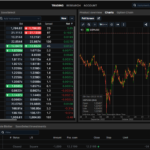The best times of the day to trade forex are the points where the main sessions overlap and business moves from one region to another. This happens first thing in the morning GMT, as Asian markets wind down for the day as London opens for business, and then again mid-afternoon London time, as US markets become active and London trading heads towards the close. The handover from the US to Asian FX centres later in the day is probably the least liquid of the three overlaps.
- Interested in trading currencies? Compare the best forex brokers here.
Best times for forex trading
Experienced traders like the morning, and beginners like later on in the day.
We’ve previously covered the best way to trade currencies in our “how to trade forex” guide. But now there is some new data on timings from FOREX.COM, the currency trading platform owned by Nasdaq-listed StoneX Group Inc (SNEX) who surveyed 3,000 forex traders to find out the best time of the day to trade forex.
The Forex.com survey examined the trading behaviour of 3,000 of its experienced clients by asking them a variety of questions related to their circumstances and trading activity.
The vast majority of the respondents, almost 76%, were employed rather than not working or self-employed.
The two largest age groups among those surveyed were 31 to 45 years olds, and those between 46 to 65 years old.
The latter group represented 34% of the surveyed clients whilst the 31 to 45-year-olds made up 31.40%.
What trading experience did the surveyed clients have?
All 3000 of the surveyed clients said that they actively participated in the online trading of forex, equities and other markets, and in terms of trading experience, the traders largely had several years of trading under their belt.
For example, 309 traders, in the 46 to 65 age range, had between 1 and 5 years of trading experience. Another 285 traders, in this demographic, had been trading for between 5 and 10 years.
Interestingly this age group also had the highest number of traders who had been trading for a year or less, with 171 traders fitting into that category.
Which forex markets were most actively traded?
Trading in Asia Pacific markets was most popular amongst the group with 46.20% of those questioned trading most frequently in these markets.
European markets were the second most popular and were traded by 29.8% of the respondents, whilst North America was most traded by just under 16.0% of the traders.
What time of day do forex traders place most of their deals?
The first hour of the business day was by far the most popular time to trade, with 1061 clients placing the majority of their deals in this period.
The last hour of the trading day is the second busiest period, with 906 clients most active at this time. The pre and post-lunch periods were the busiest for 484 and 549 of the surveyed clients respectively.
How long do currency traders keep their positions open?
The most active trading time frames were at the shorter end of the spectrum. 1273 clients said that their trades were open for periods of no more than a few hours and in some cases just a few minutes.
Those in the mid-aged cohorts (31 to 45 and 46 to 65) were the most likely to take on short-term trades, followed by those between 21 and 30. With the over 65’s least likely to do so, according to the survey data.
What are the most popular forex pairs?
When it comes to the most popular asset classes to trade the survey respondents choose equities, 1080 traders picked individual stocks as their most popular trading instruments.
Forex ranked second with 695 respondents most frequently trading in FX, whilst 454 traders favoured commodities and 297 bonds.
It’s always interesting to gain an insight into the behaviour and preferences of active traders and surveys like this provide us with a glimpse into that world.
However, surveys and opinion polls are often criticised on the basis that those who are surveyed say one thing, but actually do another.
For that reason alone, it would be fascinating to see if the survey responses matched up with, or deviated from FOREX.COMs trading data for this group of traders.
It would be more interesting still, to then run that data through the performance and behavioural management tools that StoneX Group acquired when it took over Chasing Returns.

With over 35 years of finance experience, Darren is a highly respected and knowledgeable industry expert. With an extensive career covering trading, sales, analytics and research, he has a vast knowledge covering every aspect of the financial markets.
During his career, Darren has acted for and advised major hedge funds and investment banks such as GLG, Thames River, Ruby Capital and CQS, Dresdner Kleinwort and HSBC.
In addition to the financial analysis and commentary he provides as an editor at GoodMoneyGuide.com, his work has been featured in publications including Fool.co.uk.
As well as extensive experience of writing financial commentary, he previously worked as a Market Research & Client Relationships Manager at Admiral Markets UK Ltd, before providing expert insights as a market analyst at Pepperstone.
Darren is an expert in areas like currency, CFDs, equities and derivatives and has authored over 260 guides on GoodMoneyGuide.com.
He has an aptitude for explaining trading concepts in a way that newcomers can understand, such as this guide to day trading Forex at Pepperstone.com
Darren has done interviews and analysis for companies like Queso, including an interview on technical trading levels.
A well known authority in the industry, he has provided interviews on Bloomberg (UK), CNBC (UK) Reuters (UK), Tiptv (UK), BNN (Canada) and Asharq Bloomberg Arabia.


